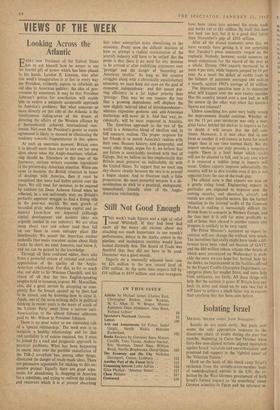VIEWS OF THE WEEK
Looking Across the Atlantic
El VERY new President of the United States
has to ask himself how he means to use the fearful gift of power which has been placed in his hands. Lyndon B. Johnson, who after this week's inauguration is at last in every way the President, evidently aspires to refurbish an old idea in American politics: the idea of gov- ernment by consensus. It may be that President Johnson's genius for conciliation will enable him to evolve a uniquely acceptable approach to America's problems. But what concerns us more directly on this side of the Atlantic is the simultaneous fading-away of the dream of directing the affairs of the Western alliance by a harmoniously achieved international con- sensus. Not even the President's power to create agreement is likely to succeed in eliminating the tendency towards fragmentation in this sphere.
At such an uncertain moment, Britain owes it to herself more than ever to sort out her own ideas about what the Anglo-American relation- ship should be. Elsewhere in this issue of the Spectator, various writers examine ingredients in the present-day American situation. When one turns to examine the British situation in terms of dealings with America, then it must be recognised that some bad habits persist over the years. We still tend, for instance, to be angered by candour (as Dean Acheson found when he reflected, in a not unfriendly way, on Britain's perfectly apparent struggle to find a fitting role in the post-war world). We emit growls of wounded pride when American capital and in- dustrial know-how are imported (although capital development and modern ideas are urgently needed in our industry). We are often smug about race and colour (and then fall on our faces in some unhappy place like Smethwick). We accept the American nuclear umbrella (but make truculent noises about Holy Loch). In short, we need America, and know it, and yet can be pained by the knowledge.
Through all these confused eddies, there also flows a powerful stream of rational and cordial appreciation of the quality of the Anglo- American relationship. For this, as for so much else, our debt to Sir Winston Churchill, and his vision of all that the two English-speaking peoples hold in common, is great. Mr. Macmillan, also, did a great service by accepting so com- pletely that the breach opened up by Suez had to be closed, and by knowing how to close it. Again, one of the most striking shifts in political thinking in recent years is the move of much of the Labour Party away from a narrow anti- Americanism to the almost fulsome addresses paid by Mr. Wilson to President Johnson.
There is no need today to use outmoded talk of a 'special relationship.' The need now is to maintain a healthy relationship; and for that end cordiality is of course required, but it must be joined by a cool and pragmatic approach to practical problems. What has been happening in recent days over the possible cancellation of the TSR-2 aeroplane has, among other things, illustrated the danger of ready-made ideas. There are persuasive arguments for sticking to this ex- pensive project. Equally there are good argu- ments for abandoning it, shopping in America for a substitute, and trying to redirect the talents and resources which it is at present absorbing into other enterprises more stimulating to the economy. Pretty soon the difficult decision of how to attempt a radical reorientation of the aircraft industry will have to be settled. But the point is that there is no need for any decision to be arrived at after stultifying arguments over `prestige' and the danger of 'becoming an American satellite.' So long as this country struggles along with a chronically unsatisfactory economy, we must keep our eyes on the goal of economic independence: and this means put- ting efficiency in a far higher priority than 'prestige.' That way we can counter the fear that a growing dependence will displace the now slightly tattered ideal of interdependence— whereas expensive gestures and anti-American mutterings will never do it. And that way, in- cidentally, will be most respected in America.
The American approach to the rest of the world is a distinctive blend of idealism and, in full measure, realism. The proper response for her friends is to match America's realism with their own. Because history, and geography, and many other things, argue for it, we believe that our future is inextricably involved with that of Europe. But we believe no less emphatically that Britain must preserve an indissoluble tie with the United States. To suggest that we must one day choose cleanly between the two is to present a bogus choice. And to frustrate such a false proposition, the most powerful weapon is a de- termination to stick to a practical, undogmatic, unemotional, friendly view of the Anglo- American relationship.






































 Previous page
Previous page